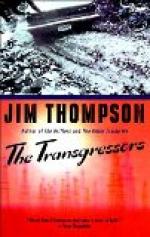Fortunately the first of the calamitous telegrams of the day has been received after the close of the Exchanges. This has prevented a panic. Brokers and bankers receive the tidings with consternation; they dread the opening on the morrow. Many of them are in the crowd anxiously waiting for further details of the deaths of the controllers of railroad and industrial stocks.
At midnight a bulletin announces that Senator Barker, who had been the staunch advocate of Bi-metallism until the recent session, and who had then voted with the Gold element, has been found murdered in his palatial home at Lakewood, N.J. His private secretary has also been killed, evidently because he had attempted to rescue his employer. Both have been stabbed.
After this the only news that is posted is of a confirmatory nature. It tells of the development of the national wave of death. Then, too, it begins to give the first positive information that the majority of the deaths have been the result of a plot.
Either on the body of each of the assassins or in his effects have been found papers that show conclusively that the men acted in concert. While the phraseology of each of the letters differ, there is a similarity which is very apparent when they are compared.
“I have kept my word. The world will judge if I was justified,” is found on one of the suicides.
“If thy right eye offend thee, pluck it out,” is all that the card on another bears.
“A part is not greater than the whole,” is the inscription on the card that is found in the breast-pocket of the man who has killed the Sugar King.
When the news of the assassination of the Attorney General is given to the people, there is a reaction in the spirit of the multitude immediately surrounding the Javelin bulletin. They have previously received the notices with expressions of wonderment. Now all realize that the Nation itself is imperilled.
“This is another Suratt conspiracy,” says one man to another.
“Will it reach the President?” is the question that men do not dare ask, though they think it.
“This is not the work of cranks, you may depend upon it,” observes a Central office detective, who has a reputation for sagacity. His fellow-officer, who stands a pace in advance of him, turns and inquires if the detective thinks he could run the gang down.
“If I am set on the case I shall not waste much time in looking for ordinary crooks,” replies the detective. “It will be my aim to unearth a society of malcontents.”
At another point a party of club men, who have come down town from their Fifth avenue haunt, stand discussing the terrible events.
“Do you remember the night that the news was received here that Lincoln has been shot?” asks a patriarchal New Yorker of an equally ancient citizen.
“Indeed I do. You and I were at the Niblo’s Garden, weren’t we?”




